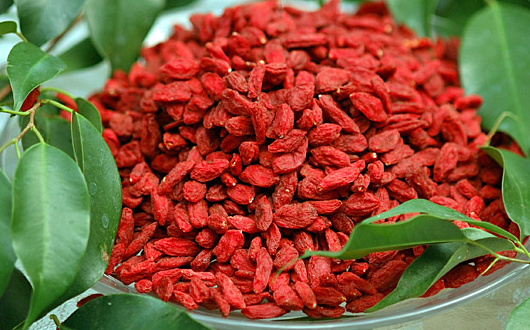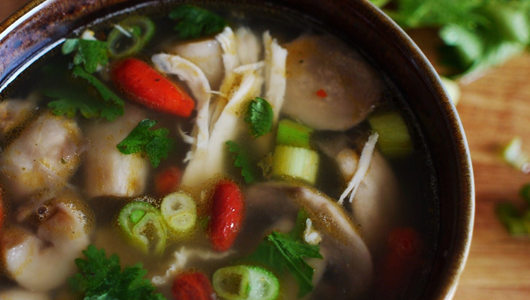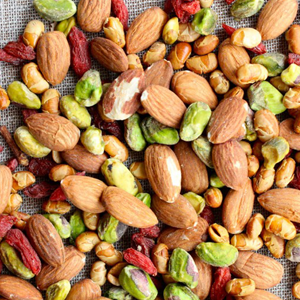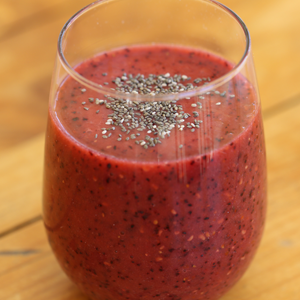
What are Goji Berries (aka Chinese Wolfberries)?
Goji berries are also known as wolfberries, Lycium barbarum, Lycium Chinense, Tibetan goji berries, and Himalayan goji berries. They thrive in the vast lands of China and Southeastern Europe.
These bright orange-red berries are sold in many health stores as well as online in their dried form. In ancient Chinese medicine, the bark and leaves were both brewed into tea.
Many years ago, goji berries played a significant role in Chinese medicine and are linked to increased strength and longevity.
In the past few years, people have discovered their potent health benefits, which have created a dramatic increase in demand for goji berries all around the globe. Due to their popularity, China, Tibet and other countries have increased exportation of goji berries.
Table of Contents
Chapter 1:: What makes Goji Berries a SuperFood?
Chapter 2:: Nutritional profile of goji berries
Chapter 3:: Health Benefits of Tibetan Goji Berries
Chapter 4:: 8 Perfect Ways to Enjoy Goji Berries
Chapter 5:: Goji Berry Recipes
Chapter 6:: Side effects of Goji Berries
Chapter 7:: Quality
Chapter 8:: Serving Suggestions
Chapter 1:: What makes Goji Berries a SuperFood?

Naturally, berries are packed full of antioxidants, which are important for overall well-being. However, goji berries specifically are found to have the highest concentration of antioxidants such as vitamins A, B, C, beta-carotene, lutein, lycopene, and selenium.
Antioxidants are important for protecting the cells from the damaging free radicals that eventually lead to chronic conditions.
Goji berries are also a rich source of essential vitamins and minerals, amino acids, polysaccharides, and phytochemicals.
Chapter 2:: Nutritional profile of goji berries

- Antioxidants and phytonutrients
- 18 amino acids
- High levels of beta-carotene
- Loaded with iron
- 21 trace minerals
- 500 times more vitamin C than oranges
- 13% more protein than whole wheat
- Contains insulin-like action that aids in fat decomposition
- Rich source of vitamin B1, B2, B6, E, calcium and magnesium
Chapter 3:: Health Benefits of Tibetan Goji Berries

Tibet is a region in China where people have lived longer lives as compared to the people living outside of this area.
In a study made by the Pasteur Institute in Paris, the longest living people are typically found in Tibet and China. This information clearly shows that the nutritional habits of Tibetans and the ancient Chinese are truly healthy and organic. The Chinese serve as an inspiration for a more healthy and longer life.
According to an observation, Tibetan goji berries have been a staple food to the ancient Tibetans and ancient Chinese. Goji berries are typically found in local riverbeds around these areas.
The berries fall into the river and are easily dissolved. The locals who lived near the riverbeds drank the water supplies and often ate the berries. These people are found to have lived longer lives.
Today, you don’t have to go to China to acquire goji berries. Many merchants in China sell goji berries not only in their villages but also to many other parts of the world.
The health benefits of Tibetan goji berries include:
-Increase in longevity: One of the most valued aspects of goji berries is the ability to combat the effects of aging, which is known to increase longevity.
-Unlike other supplements, goji berries provide nutrients down to the cellular level, so you will get the most impact from it.
-Boosts immune system: Colds and flu are common illnesses and can be prevented by regular consumption of goji berries.
–Goji berries help with weight loss.
-This superfood has high levels of vitamin C, a potent antioxidant that helps combat these conditions.
-Aids a healthy nervous system: Improved memory and concentration are very important aspects that should be considered.
-The vitamins, minerals, and phytonutrients help the body repair wear and tear on the brain processes.
-Improve blood circulation: An improved circulation helps the body to get more nutrients from the blood thus feeding the various systems that need the nutrients.
-Proper blood circulation is also known to protect from cardiovascular diseases. Furthermore, improved circulation helps joints and extremities.
-Contains trace elements and antioxidants: Nutrients and antioxidants are important in the various physiological processes and without them, the body’s systems can fail.
Obviously, there are numerous Tibetan goji berry benefits. Although, the berries help many health conditions, they should not be used as an exclusive medicine.
Due to its overflowing amount of nutrients, goji berries should be considered as a dietary supplement consumed regularly. We know that humans do not live forever, but consuming the berries may lead to a happier, healthier life.
To read how your children health will benefits from Gojiberry, click here
Chapter 4:: 8 Perfect Ways to Enjoy Goji Berries

Goji berries have been widely used in China and other East Asian countries for centuries. Goji berries are known as “happy” berries due to their perfect combination of sweet and sour taste. They can most readily be found in a dried form. According to the Chinese, these tangy fruits aid in many conditions and have been known to improve eyesight, protect the liver, boost the immune system, promote longevity, and enhance fertility.
Moreover, goji berries are an excellent source of vitamins and minerals. In fact, they have 2.2 milligrams of protein in a 1/8 cup serving, while providing about 6% of the Recommended Daily Allowance (RDA) for calcium. They also have about 283% of the RDA of vitamin A and 4 grams of protein per serving.
In addition, goji berries contain antioxidants and phytonutrients that are well-known for their anti-aging properties and prevention of certain types of cancer. Adding goji berries to your diet can help your body’s overall health.
Goji berries can be enjoyed in many different ways such as:

Goji Berries as a tea
In the ancient times in China, goji berries were often used in tea and made a flavorful addition to soups and stews. You can simply put a handful of goji berries into a cup of previously hot or even cold water and let it sit for about 10 to 15 minutes. Once they become plump and juicy, you can now enjoy a sweet little treat in your tea. Read interesting Goji Cranberry Lemon Tea recipe here

Blended into Smoothies
Adding these goji berries to your smoothies is a simple way to enjoy the goji berry’s benefits. Soak about 1 tablespoon of goji berries for 10 minutes to let them hydrate. After which, add them directly into your smoothie. Because goji berries are naturally rich in protein, they are ideal for athletes or for those who workout frequently.

Eat them raw
Whether these berries are freshly picked or dried, chewing them like raisins is a fun way to consume them. They are not overly sweet in nature making them perfect for snacks.

Goji Berry Trail Mix
Aside from snacking on them, you can also enjoy the delicious flavor of goji berries by adding them into trail mix. Chop them into smaller pieces then mix them in with nuts, seeds, or dried fruits. It is not just tasty, it’s healthy too.

Add them to your Cereals
Adding goji berries to your cereals is a great to start your day. With its high nutrient content, these berries will surely boost your energy needed for an entire day of work. Click here to read Goji berry Granola Recipe

Goji Berry Energy Bars
For those who have a sweet tooth, goji berries are a perfect treat for you. Blend a handful of goji berries together with a cup of almonds, pumpkin seeds, 1/3 agave, 1 teaspoon cinnamon, and ½ cup cacao nibs. Stir until well combined. Once done, remove from the processor then place it into a large bowl and add flax seeds. Press into a rectangle on a non-stick dehydrator then dehydrate at 145 degrees. After 45 minutes, reduce the heat to 115 degrees and dehydrate for 3 more hours. Afterwards, peel off the dehydrator sheet, cut it into bars, and dehydrate again for about 2 to 3 hours.

Added to Soups
In China, adding goji berries to soup has been practiced for thousands of years. Mix them into your favorite chicken soup stewed slowly with red dates during the last 10 minutes.

Muffins
Kids enjoy muffins very much, so adding a few goji berries will help enhance their flavor while obtaining the essential vitamins and minerals your growing child needs.
Goji berries are commonly sold dried, powdered, or even juiced, and are usually available at natural food markets and online. Always look for a reputable distributor to ensure the authenticity of the products you are about to purchase.
Chapter 5:: Goji Berry Recipes

These berries have many health benefit claims associated with them. This tangy fruit contains essential nutrients and antioxidants that our body needs. They contain higher amounts of vitamin C than oranges, more beta carotene than carrots, and more iron than steak. They are also packed full of B-vitamins and phytonutrients that combat the harmful free radicals that damages the cells in the body. Goji berry’s polysaccharides help build a strong immune system.
These berries can be eaten raw or cooked and are a tasty addition to tea, soup, smoothies and other baked goods. Here are some easy and simple recipes to enjoy goji berries.
Goji Berry Oatmeal
How to make healthy Goji Berry Oatmeal
Prep Time: 5 min
Total Time: 10 min
Servings: 2
Goji Berry Smoothie
How to make Goji Berry Smoothie
Prep Time: 15 min
Total Time: 20 min
Servings: 2
Aside from using goji berries in blender drinks, baked goods, stews, and fruit leathers, you can also be creative and use them in your own special creations. The ways to use these berries are endless. Goji berries are sold in different stores and online. To ensure the quality of the goji berries being sold, always make sure to purchase them through a certified seller. You can purchase organic goji berries here.
Chapter 6:: Side effects of Goji Berries

We’ve been hearing goji berry testimonials supporting and giving praise to its beneficial health effects. However, testimonials against goji berries are also growing by the minute. So the big question is, are goji berries harmful?
Like many other things, increased consumption of goji berries, especially if not used to it, or just starting goji berry intake, is bad for the body. Most of the testimonials against goji stated that they consumed the berries on an empty stomach or ate huge amounts of berries.
After an hour or two, they either experienced severe headaches or dizziness followed by repetitive vomiting. Some people reported suffering from stomach bloating, cramping, and even diarrhea.
One person even likened his experience to that of food poisoning. These symptoms last for hours, sometimes days. To avoid digestive problems, goji supplements should be taken with food or on a full stomach and people are encouraged to not ever overindulge with consumption.
Aside from digestive problems, people who consumed goji berries also reported having body rash and itchiness, which started minutes after berry consumption. This effect does not discriminate by age, because based on the testimonials, digestive problems happen to adults and small children as well.
People with pollen allergies should stay away from this fruit because, according to case reports, they found a link between goji berry consumption and skin photosensitivity or increased reactivity to light, which causes a skin rash to develop upon exposure to sunlight.
In rare cases, goji berries are also blamed for increased bleeding. The natural properties of the berry may affect blood clotting. A case study published in PeaceHealth.org, reported a woman who suffered from increased bleeding during menstruation after she consumed three to four glasses of goji juice every day. Be sure to know if you have any history of blood clot-related disorders before consuming the goji berry.
Possible drug interactions may also occur if a person is already taking prescription medications for conditions related to high blood pressure or the treatment of diabetes. It’s a good idea to check with your doctor first, before adding goji berries or any new supplement to your diet.
Just remember to consume goji berries, or any goji-related product, on a full stomach and in moderation. It is also good to remember that goji berries may be very good for some people, but not for everyone.
Chapter 7:: Quality

Goji berries are found in the vast valleys and hills in Tibet and Mongolia where the soil is naturally rich in nutrients.
The goji berries that are grown in these regions tend to have the highest amount of nutrients than the other varieties of Lycium.
Chinese wolfberry, also known as Lycium barbarum, is a relative of the goji berry. However, this should not be confused with the goji berries themselves, as they have a different make-up and grow in a different environment.
A typical goji berry grows on bushes that reach over 15 feet. When they are harvested, hands never touch them because they will turn dark and their potency. Harvested goji berries are shaken onto mats and then dried in the shade.
The berries are grown and harvested with the strictest organic standards, this is why they have the purest form of nutrients compared to other cultivated varieties such as wolfberries.
Chapter 7:: Serving Suggestions

Goji berries come with a mild taste and flavor, which is why they are easily mixed in smoothies, juices, trail mixes, cereals, and other recipes.
Similar to raisins, goji berries can also be used as snacks like other dried fruits.
The recommended amount of goji berries, to acquire the desired energy and health boost, is about 2 to 3 grams per day. This equates to about 20 to 40 berries daily.
[widgets_on_pages]




